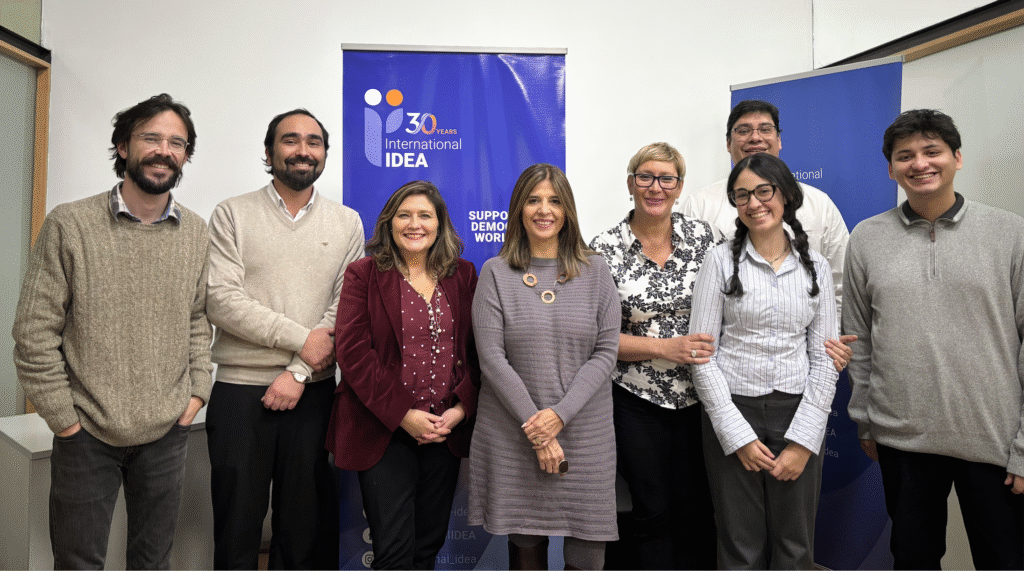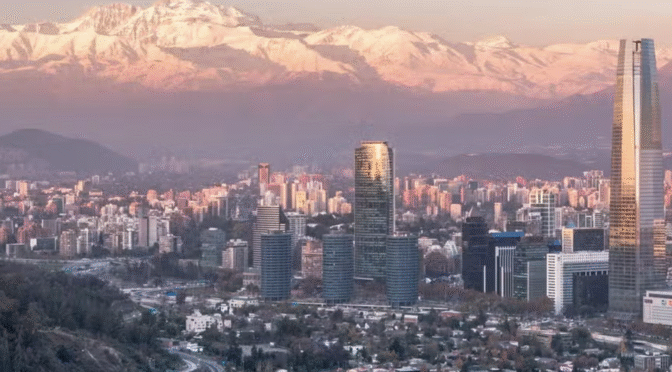By Zack Frailey Escobar, PhD student in the UT Government Department
My experience working with the International Institute for Democracy and Electoral Assistance (International IDEA) in Santiago, Chile has been transformative, both professionally and personally, and has left a lasting mark on the way I envision my future as a political science researcher. Working alongside a team committed to defending democracy in challenging contexts at one of the most critical junctures for electoral systems in Latin America and around the world has allowed me to deepen my technical and analytical skills while building collaborative networks that will continue to inform my research agenda for years to come.
One of the most enriching aspects of my experience at IDEA has been the opportunity to collaborate closely with professionals from diverse disciplines and nationalities, all united by a shared commitment to democratic integrity. From analysts specializing in artificial intelligence and disinformation to experts on digital gender violence and electoral authorities, every interaction represented a chance to learn, exchange perspectives, and strengthen a community of practice.
At IDEA, I have been helping to build a regional workshop on disinformation, electoral integrity, and digital gender-based political violence, targeted at journalists, political and electoral officials, and social media executives and regulators. I am also supporting the team behind a workshop on artificial intelligence and electoral processes, which explores the risks and opportunities of emerging technologies for democratic governance. This project, organized in partnership with the Spanish Agency for International Development Cooperation (La Agencia Española de Cooperación Internacional para el Desarrollo, AECID), brings together international experts to discuss regulatory frameworks, algorithmic bias, and comparative models of tech governance. Through this work, I have developed lasting ties with specialists in electoral law and digital regulation from Chile, Brazil, and Colombia—voices that added crucial insights to ongoing debates about the impacts of digital communication and democratic governance. I am hopeful that this work can not only help mitigate the risks to democracy from online disinformation, but also build on the collaborative use of AI and other emerging technologies for democratizing knowledge.

IDEA offers a unique vantage point into the practical dilemmas faced by those on the frontlines of democratic defense: how to respond to orchestrated disinformation campaigns, how to protect female candidates from coordinated misogynistic attacks, and how to engage with digital platforms that often operate under opaque rules. These challenges are far from abstract—they emerge with urgency in real-world settings and demand applied, interdisciplinary, and context-sensitive research.
One paradigmatic case I have been working on is the 2024-2025 Romanian presidential election, which became a thorny example of how algorithmic manipulation, bots, and legal ambiguity can undermine public trust in electoral outcomes, especially in countries in the crosshairs of larger geopolitical powers. Investigating this case and participating in discussions and debates with colleagues around how to frame the relative importance of online disinformation, foreign influence, and possible regulatory overreach has clarified my own thinking about these issues and raised new questions ripe for further research. I am hopeful that our analysis of the Romanian case can become a core teaching component of IDEA’s workshops, sparking rich discussions about similar dynamics in Latin American settings.
One of the main reasons I applied for this internship was to bridge the gap between my academic work and on-the-ground realities in Latin America and in Chile specifically. As a PhD student in the Government Department at the University of Texas, my research so far has been focused on Chilean politics in the aftermath of the 2019 political upheaval known locally as the estallido social (“social outburst”). The opportunity to embed myself in this context—particularly in the midst of the presidential primary season—has given me a new perspective on my research that will inform my work for the rest of my career.
Beyond the specific projects I worked on, my time in Santiago was also deeply human. Informal conversations with colleagues, shared lunches, and evening walks through downtown Santiago after work helped me discover a generous, open, and deeply committed community. Outside of my time at IDEA, I have had the opportunity to engage in my own self-directed cultural and political education, interacting with election canvassers, visiting the Museum of Memory and Human Rights, witnessing an enormous Indigenous People’s Day parade in Valparaiso, and even attending a football match of FC Palestino, a powerful symbol of the Palestinian diaspora community here in Chile. These interactions have affirmed for me that the defense of democracy isn’t only carried out through major reports or international events, but also through everyday work, collective care, and attentive listening.
My internship at International IDEA has been much more than a professional experience. It is a space for integral learning, a laboratory of ideas, and a platform for action. I will return to my PhD program not only with a stronger CV, but also a sharper perspective, and a network of mentors and peers who will continue to accompany my journey. At a time when disinformation, digital violence, and institutional capture threaten the foundations of democratic life, experiences like the one I had in Santiago are essential for shaping researchers who are both rigorous and engaged. IDEA not only gave me analytical and methodological tools but also strengthened my conviction that it is possible to contribute, from academia, to a more inclusive, just, and resilient democracy. I can’t wait to see what the next few weeks in Santiago have in store and to carry that back with me to UT.
